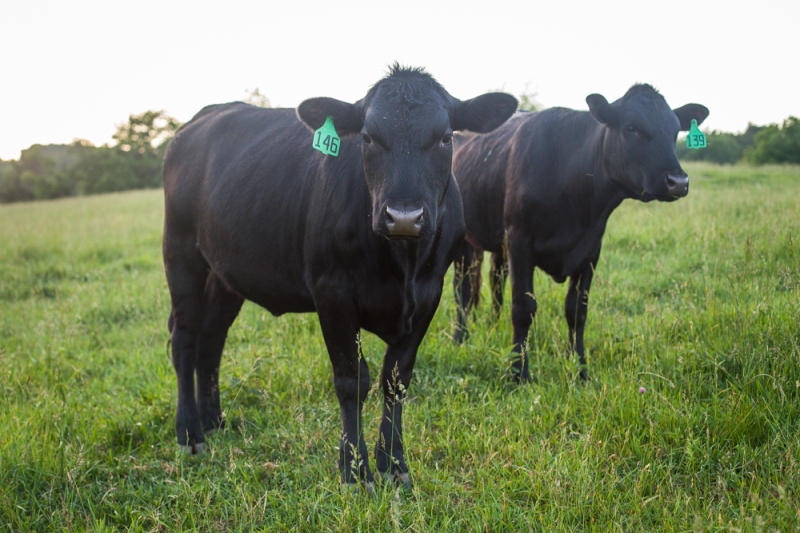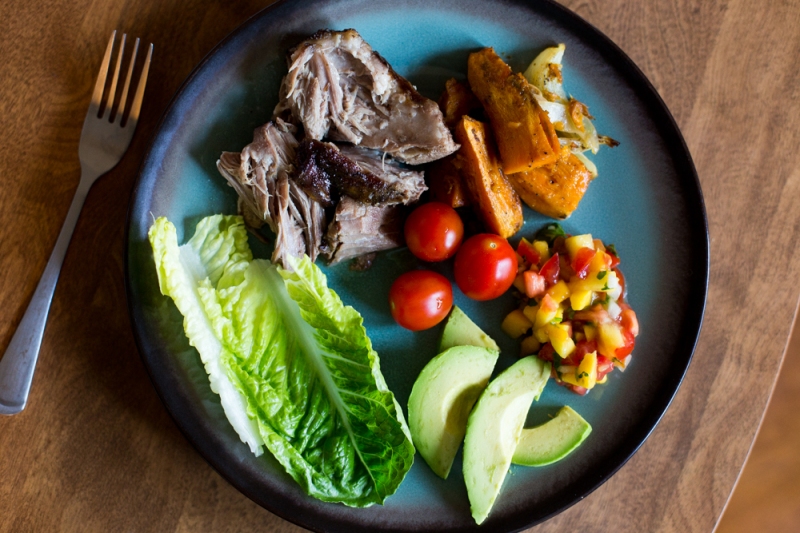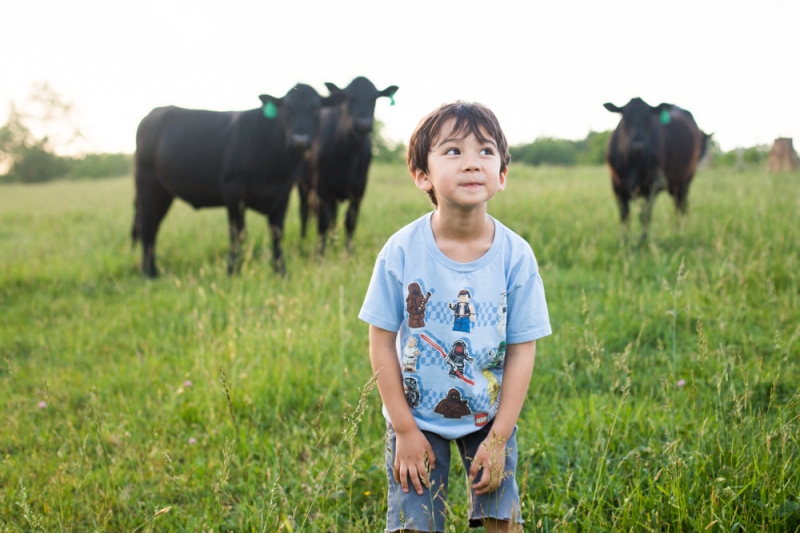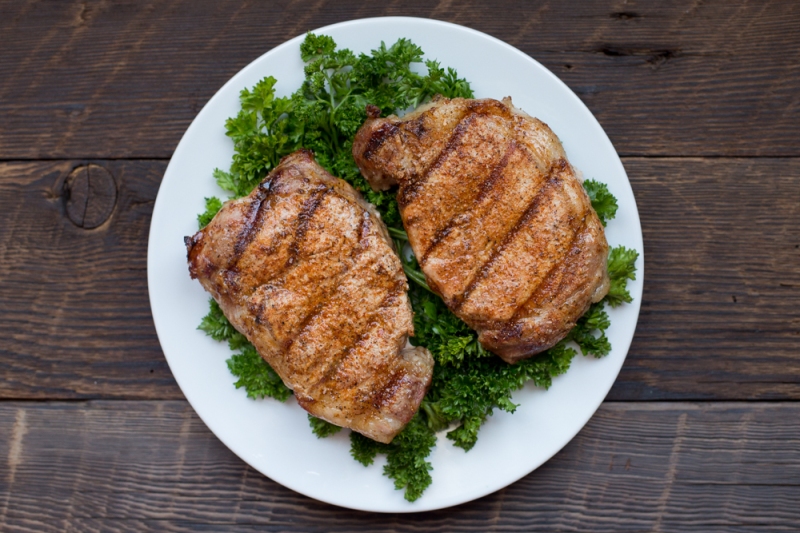
Last month, I wrote about how I wanted to take my blog in a new direction by visiting and writing about food producers around the world, in order to better understand how the food we eat gets onto our plates. Off the bat, I knew that one of my first destinations needed to be where the whole “food” thing starts. At a farm.
Choosing a farm to visit was easy. Last summer I met David Maren, founding farmer and general manager of Tendergrass Farms, and we quickly became friends through our mutual love of languages and our mutual disdain for our country’s rampant, negligent farming practices. We’ve also been working together over this past year; he sends me samples of food to cook and eat, and I take pictures of that same food for his website. It’s a pretty sweet deal for both parties, hearkening back to humanity’s bartering days: he gets free photography and my family gets free food.
David’s small farm is located near Floyd, VA (about 4 hours from us), so we made the drive down a couple weekends ago to check out and talk about his company. Here is what I found out.

Slow-cooked pork shoulder lettuce tacos, made by David’s wife Ann
Before I get started, I want to address one issue – that this cannot be a completely impartial writeup, since I consider the Marens to be our friends. The truth is, I wanted to interview a farmer that I knew and trusted, because it allowed me to comfortably ask somewhat intrusive questions to get to the core of what I wanted to find out. So consider this writeup to be less a way of selling you on their products, but more a study of what farmers are up against in terms of government and market challenges. I should also note that I am in partnership with Tendergrass as an affiliate, but no affiliate links appear in this post.
Tendergrass Farms is a relatively new project, only a couple years old. David has partnered with family farms in Virginia and North Carolina (including Joel Salatin, who also supplies pork to Chipotle). He acts as a guide to connect farms to an audience. This concept makes a lot of sense; if you’ve ever tried to track down a local farm, discuss how they treat their animals, talk about their pricing, and finally figure out a time that works well for both you and the farmer to visit, you know that it can be quite an endeavor. And for good reasons – farmers like to farm, not market their product. Tendergrass Farms simplifies this idea; David carefully vets the farms and markets their products, and customers have a one-stop-shop for quality meats delivered to their homes.

Oliver hanging out with some grass-fed cows
I had several questions about the company, and how it is run.
First and foremost, I wanted to talk prices with David. Their product prices aren’t cheap, especially compared to your average grocery store chain. We spent a long time talking about everything that goes into running a small farm; the costs associated with raising, slaughtering/butchering, inspecting, packaging, and shipping their meats with total quality is not only difficult, but expensive. Since nearly all of their farming practices are essentially the opposite of current industry standards, it’s simply more expensive to get things done properly – every step of the way.
Some of the costs come from ensuring high quality products. Their chicken and turkeys are air-chilled, contrary to the rest of the industry, and results in more food for your buck. Their pigs are 100% pasture-raised and fed exclusively non-GMO feed, which has been increasingly difficult over the years due to nationwide corn shortages and the prevalence of GMOs. Grass-fed cows take longer to come to an appropriate size, which ends up costing the farmers more, and their beef is dry-aged for 21 days, making it more flavorful and tender. Their packaging is 2/3 thicker than typical vacuum-sealed packaging, which costs more but ensures their meats nearly always retain their seal.
One way that David helps his customers consider the costs associated with his business has been to maintain transparency. They recently decided to not offer coupon codes or sales – the price you see for their products is what they can offer while still staying a business (although prices may occasionally fluctuate based on the current business market). They also list all of their family farmers and go into depth about their business processes and supply chain on their site. David takes the transparency aspect of his business very seriously; their business line is actually his cell phone number.
David explained that when he first realized how much he needed to charge people just to stay in business, he was embarrassed by the prices. Today, he wears Tendergrass prices like a badge of pride. And they continue to gain customers, which is a sign that more people are willing to pay the costs associated with going against America’s CAFO meat industry. Truth be told, their prices are actually appropriate in terms of what every country pays for food compared to their annual income (except the US) – the real cost of food when subsidies and shortcuts don’t come into play (source).

The Maren’s 8-acre farm
Another issue I wanted to talk about was my concern that by buying your meat online, you’re not supporting local farmers or the environment in the same way that they are through visiting the farm or the farmer’s market. After all, driving a piece of meat across the country wastes way more gas than driving an hour to your local farm, right? But after looking at the facts, I realized that transporting the meat in bulk to their centralized shipper in Nebraska is way more efficient; in fact, it’s 14x more efficient to have 25 pounds of meat delivered from Nebraska than it is to drive 40 miles each way to buy it from a local farm (source). Truthfully, I hadn’t ever really considered the efficiency of our bulk transportation industry, but it makes sense.
And like I mentioned earlier, many farmers are happy to partner with someone to help them market their product, so they can get back to working on their farms. So while it’s not as personal as you’d expect, it’s still directly supporting farmers. Not to mention the fact that it’s much more convenient for both the farmer and the customer. While I enjoy meeting a farmer who drove an hour to my local farmer’s market, I prefer the idea of that same farmer spending his Saturday mornings at home with his family.

Some of the best pork chops around – but where are the trotters?
Lastly, I talked to David about their product choices. I’m a big fan of lesser cuts, like organ meats, feet, and tails, which with the exception of beef liver aren’t sold by Tendergrass. Turns out, it’s not that they’re against selling these cuts of meat (in truth, they want to sell everything), but they are such a small business that they don’t produce enough of these products to cover the costs of having them processed, inspected, packaged, and shipped.
This was a new concept for me – that the cost of processing and packaging something like oxtails is often too high to offer a reasonable price for them (I like oxtails, but I won’t pay $60/lb for them). Their goal is to eventually grow large enough to be able to offer these products, and they’re starting to expand already; just this past week they started selling jars of lard (the first batch sold out in 45 minutes).

We had a great time visiting rural Virginia, and relaxing on their small farm. One of my favorite moments is when we visited a local creek deep in the forest; while there, we found a still-standing chimney and a rock wall, remnants from a house that had been abandoned decades (maybe centuries?) earlier. We also caught sight of a small black bear while hiking. It’s pretty thrilling (and a little frightening) to see a bear in the wild.
Overall, the trip was very enlightening, despite the fact that I grew up on a small farm and have been visiting farms for several years. To me, Tendergrass Farms is an indication of the relationships we will have with farmers in the future. It’s really awesome that people live where they are close enough to visit and buy directly from quality farms, but that is sadly becoming an exception to our country’s norms. With responsible online vendors like Tendergrass, I’m comforted that new food solutions are forming.

Thank you for this post. I just recently joined a food co-op in Texas, as a way to find beef, pork and chicken from better raised sources. One of the downsides was that the farms were not exactly “local”. Love your take on this. It’s so difficult to find good sources, it’s nice to know it’s not always the worst thing if they have traveled a bit.
LikeLike
Interesting to read about small farms
Sent from my iPhone
>
LikeLike
What a great post – and I loved seeing the pictures! I think you discussed some very important issues as to the cost of raising grass-fed meat and non-CAFO production. This is one of the biggest obstacles people have to converting to a whole-food diet (at least in my family that is). Look forward to more travel posts – Oh and whatver that pork dish is in the food plate picture – looks yummy.
LikeLike
chance of coming to Australia? I can recommend this wonderful place:beefatthefarmgate.csentinel.com
LikeLike
Ruth, Australia is totally on my list of places to visit :)
LikeLike
Great post- thank you. I wish more folks had access to food raised this way. I’m in Phoenix, AZ and we buy from Chiricahua Pasture Raised Meats in Wilcox. I highly recommend them for anyone in the area- they deliver monthly to Phoenix and Tucson.
LikeLike
Hi Russ, it would be great for you to come to New Zealand and look at our farming practices. Mostly our sheep and beef and dairy is grass feed but funnily enough – or sad, grain feed or grain finished is usually promoted as something special!
LikeLike
NZ would be absolutely awesome. Just need to find someone to sponsor my trip! :) I’ve heard the same re: grass/grain fed in several countries – too funny!
LikeLike
Wow, great article. Just starting to poke around your site after getting a link from faveglutenfreerecipes.com today. Anyhow, wanted to give a nod to my local farm and dairy, Birchwood Farm and Dairy, in Newtown PA. If you ever get the chance to come to Bucks County, PA, which has many farms that practice organic and traditional farming methods but can’t afford to pay the government to have the “organic” label, do check out Birchwood. This farm is the one we support because the senior owner (father/son business) is also a veterinarian & we take our dogs to him. His name is Dr. Tierney, he’s great in that he’s not a vaccine pusher, only wants to do state requirements and recommends raw food diets for the dogs….he had us laughing when we asked about dogs choking on bones.He simply said he never treated a dog that had a bone stuck in it’s throat and that they can eat even small chicken bones. He’s on same site as the farm and dairy and I’m sure being a vet has greatly helped the farm and dairy aspect of his business in many ways. The other Bucks County farm I would spotlight would be Thorpe’s First Nation Farm. I do honestly believe local government are trying to keep this one down for a land grab to put mega homes in for people who commute to big New York and New Jersey jobs but want to live in the beauty of our area. The owner is related to former Olympic winner Jim Thorpe. Then complete your visit by seeing the Ringing Rocks Park – musical rocks and a waterfall are an incredible treasure of Bucks County, PA. I don’t want to post a bunch of links at the end here but all places mentioned have websites if you google them, Birchwood needs to looked up as Birchwood Farm and Dairy or you get somewhere else. I look forward to reading about different farms you get to visit and will be sure to be around on “New Recipe Tuesdays”. Now I will continue exploring your site – thanks for it!
LikeLike
Christina, thanks for all the great info! I’ll check it out :)
LikeLike
Russ, great article. I feel so lucky to have access to so many 100% grass fed, pastured and organic family ranchers within driving distance, plus one (a Joel Saladin protégé) who is a little further away in the state but who personally delivers to my area.
One of my favorite produce farmers (I’m in their CSA) also has a degree in documentary filmmaking and she made a great video about why her organic pastured eggs are so expensive. Hopefully you can view it here:
http://fifthcrowfarm.com/eggs/
When are you coming to California?! I could hook you up with some awesome ranchers and farmers!o
LikeLike
Susan, thanks for the info! I don’t have any solid CA plans yet – I was hoping to come to the Ancestral Health Symposium in the SF area this summer, but I had to pull out due to work commitments. Soon, though!
LikeLike
You have that habit of sharing the yummiest and with this post you went ahead with the actual source of yummy storage :) This is wonderful by the way, I felt I was in those farms!
LikeLike
I’m really liking these posts! Ever since making the leap about five years ago from cheap $.99/lb Costco boneless-skinless chicken breasts to gladly forking over $6.00/lb (and up!) for a whole chicken, including the neck, giblets and feet of course, I’ve been on a mission to really KNOW where my food is coming from. My little family has been going to the same farmers market every Saturday morning for five years. We’re on a first name basis with certain vendors and proudly call them “our” farmers. They’ve seen my daughter go from a tiny toddler to a meat and veggie loving kid. Some set aside special sausage for the kiddo because it runs out so fast and we’ve been able to try experimental mushroom breeds. We make a habit to visit those farms at least once a year and have never been disappointed. In my experience, Farmers who are proud of their work enjoy explaining the what and how behind what they do.
I understand it’s not possible for the majority of people to do this (or even want to), which is why I appreciate posts like this so much. We’ve decided against moving out of Minnesota so many times because of the access to amazing food we have here. If it ever happened, I’m happy to have reliable resources like Tendergrass to ease the transition.
LikeLike
Viva la non-industrial farms! Happy local farming.
LikeLike